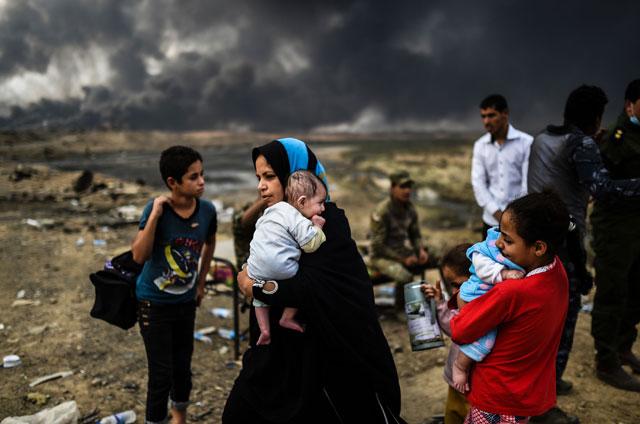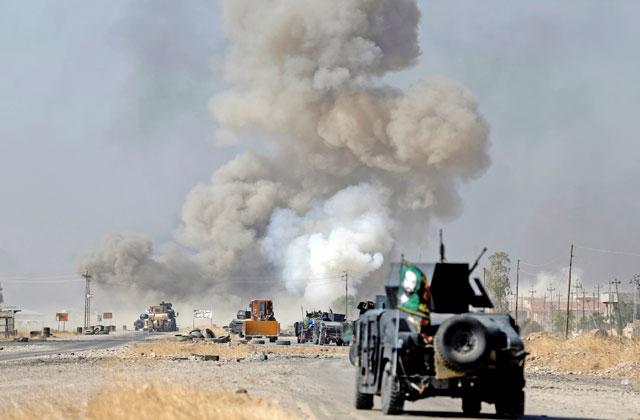You are here
Iraqi army’s elite force pauses advance near Mosul
By Reuters - Oct 25,2016 - Last updated at Oct 25,2016

Iraqi families, who were displaced by the ongoing operation by Iraqi forces against Daesh militants to retake the city of Mosul, are seen gathering on an area near Qayyarah on Monday (AFP photo)
EAST OF MOSUL/BAGHDAD — An elite unit of the Iraqi army paused its week-long advance on Mosul as it approached the city's eastern edge on Tuesday, waiting for other US-backed forces to close in on Daesh’s last major urban stronghold in Iraq.
On the ninth day of the offensive on Mosul, government forces and allied Kurdish peshmerga fighters are still fighting their way towards the outer limits of the northern city, in the early stages of an assault which could become the biggest military operation in Iraq in over a decade.
The first force to get near to Mosul, advancing to within 2km of Iraq's second largest city, was the elite US-trained Counter Terrorism Service (CTS).
CTS troops have moved in from the east, dislodging Daesh from a Christian region that has been empty of residents since the extremists took it over in 2014.
The combat ahead is likely to be more difficult and deadly because of the presence of civilians. Some 1.5 million residents remain in the city and worst-case forecasts see up to a million being uprooted, according to the United Nations.
UN aid agencies said the fighting has so far forced about 9,000 to flee their homes.
But Lise Grande, the UN humanitarian coordinator for Iraq, told Reuters that the United Nations expects a mass exodus from Mosul, perhaps within the next few days.
In the worst case scenario, Grande said it was also possible that Daesh militants who have controlled Mosul for more than two years could resort to “rudimentary chemical weapons” to hold back the impending assault.
UN human rights spokesman Rupert Colville said Daesh militants have reportedly killed scores of people around Mosul in the last week.
Colville said that security forces discovered the bodies of 70 civilians in houses in Tuloul Naser village south of Mosul last Thursday. Daesh also reportedly killed 50 former police officers outside Mosul on Sunday, he said.
90 villages retaken
The Mosul campaign, which may become the biggest battle yet in the 13 years of turmoil unleashed by the US-led invasion of Iraq in 2003, aims to crush the Iraqi half of Daesh’s declared “caliphate”.
Washington has fewer allies on the ground in Syria, where it has supported rebels fighting President Bashar Assad, but Defence Secretary Ash Carter signalled on Tuesday that the fight against Daesh there may be stepped up, saying he expected the campaigns against the extremists in Mosul and the Syrian city of Raqqa to overlap.
In Iraq, a commander said the CTS advance on Mosul was pausing to allow other military units to make similar progress and consolidate the front before pushing further into the city.
The Iraqi force attacking Mosul is 30,000-strong, supported by US special forces and under American, French and British air cover. The number of insurgents dug in the city is estimated at 5,000 to 6,000 by the Iraqi military.
About 90 Daesh-held villages and towns around Mosul have been retaken so far into the offensive, according to statements from the army. The distance from the frontlines to the city ranges from just a couple of kilometres in the east, to 30 kilometres in the south.
In Khazna, one of the villages recaptured on Monday by the CTS, some of the fighting appeared to have gone from house to house, leaving smoked out buildings with their contents turned upside down, a Reuters correspondent said. A disabled Humvee and the remnants of a car bomb could be seen on a desert path.
CTS snipers hid on rooftops at the edge of village keeping watch over the desert areas extending to Mosul.
Although CTS is a government unit, many of its Humvees fly the Shiite flags of Iraq’s majority community. Such a display could antagonise Sunnis who make up most of the population in Nineveh province around Mosul.
Battle for desert town
Seeking to relieve pressure on their forces controlling the northern Iraqi city, Daesh extremists who have waged counterattacks across the country battled Iraqi troops in the desert town of Rutba, 450km to the southwest.
Daesh attacked Rutba on Sunday, and has been fighting since then for the town, which lies on the main highway running west from Baghdad, close to the borders with Jordan and Syria.
The militants expanded the area of Rutba under their control from a third to about half Monday overnight, forcing the government to send reinforcements.
Anbar province, where Rutba is located, has been a hotbed of insurgency against the Shiite-led government and the US forces that overthrew former president Saddam Hussein, a Sunni, in 2003.
The Daesh attack on Rutba came after an assault on the Kurdish-held oil city of Kirkuk last week, which prompted local authorities to start expelling Sunni Arabs over fears there could be Daesh sleeper cells in their midst.
Hundreds of displaced Sunni Arab families who had been sheltering in the Kirkuk province from the conflict with Daesh began moving out after authorities told them on Sunday to leave or face being forcibly expelled, humanitarian workers and residents said on Tuesday.
“The United Nations is very concerned about any action that could be understood as collective punishment,” the UN’s Grande said, adding that she was worried that the move could also set a precedent in a region riven with ethnic and sectarian divisions.
About 330,000 Sunni Arabs have taken refuge in the oil-rich Kirkuk province in the last two years, after Daesh swept through northern, central and western Iraq in 2014.
Daesh militants stormed police stations and buildings in Kirkuk on Friday, killing about 100 security force members and civilians. Sixty-three militants also died in the heavy fighting that lasted until Sunday, when authorities restored control.
The militants are suspected to have come from Hawija, a pocket still under their control west of Kirkuk, but authorities also suspect that they were assisted by sleeper cells hiding among the displaced people or even by Sunni Arab residents.
Kirkuk is the most disputed area of Iraq because of its complex population mix. The Kurds took full control of the province in 2014 after Daesh overran much of the north of the country and several divisions of the Iraqi army disintegrated.
Related Articles
KIRKUK, Iraq — Iraqi forces launched an operation on Tuesday to retake a northern town from the Daesh terror group in the latest move to pre
EAST AND NORTH OF MOSUL, Iraq — The offensive to seize back Mosul from the Daesh terror group is going faster than planned, Iraq's prime min
Erbil, Iraq — Iraqi forces battled Sunday through booby-traps, sniper fire and suicide car bombs to tighten the noose around Mosul, while al
















